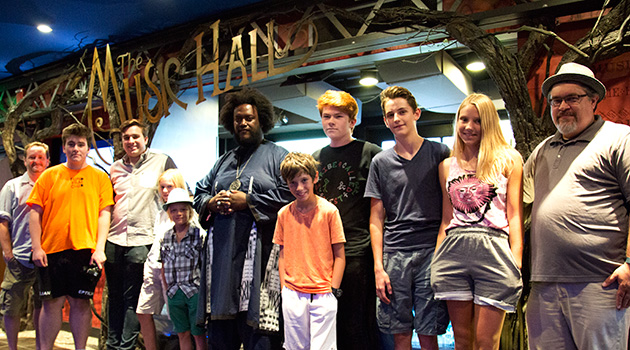The Music Hall and PMAC Make Memories for Students

“I’m really excited to talk to Kamasi and listen to his story,” says Noah, who began playing music in his school band and chose the saxophone as his instrument of choice because of the richness of its sound and because “it feels so good to play.” The other students play a variety of instruments including cello, violin, drums, guitar, and trumpet. “I just started studying at PMAC a few months ago,” says 12-year-old Claire Barbour, who plays the cello. “It’s a lot of fun to play in a band with different kinds of instruments and to be involved with music collaboration. I’m interested in how Kamasi collaborates with Kendrick Lamar.”
The fact that kids from a nonprofit community arts school on the Seacoast of New Hampshire have the opportunity to get up close and personal with major artists is due to the longstanding partnership between The Music Hall and PMAC. It’s a natural fit, says The Music Hall’s Outreach Manager Chris Curtis, who helps to organize partnership programs with PMAC (and many other community nonprofits). “It’s a great quid pro quo,” he notes. “PMAC’s Executive Director Russ Grazier is a super advocate for the arts and arts education, as is The Music Hall. We’ve co-supported each other over the years with artist encounters for students that range from meet and greets to master classes, and with offering free daytime tickets for students to attend the PMAC faculty annual jazz concert at the Loft.”
Adds Russ Grazier: “It’s an amazing opportunity for our students to meet with artists like Kamasi Washington and go behind the curtain to hear his sound-check. Jazz musicians tend to be generous about spending time with students, but if it wasn’t for The Music Hall, there would not be any chance of a local meet-up with superstars like Kamasi.” Such intimate exposure to world-class artists not only fires up enthusiasm, but it’s also an experiential lesson about the lineage of the jazz tradition, and how it lives from generation to generation, says Grazier.
Gathering with the students, Washington exemplifies that tradition as he talks about growing up with his sax-playing father Rickey, who encouraged him to play clarinet before he took up the saxophone. “I learned that it’s good to play other instruments and to get a perspective,” says Washington. “I still play the clarinet and the flute. But when I started playing saxophone it opened up my enthusiasm and made me want to practice every day.” His career advice to the young musicians: “Take your time. Today there are more possibilities to be a self-contained artist—you can put up a website, record in your home, put your music on iTunes. Establish yourself first, then look for a record company to help you do what you’re already doing.”
When Kamasi’s dad Rickey joined the band that night for an electrifying and multi-layered performance that had the audience to their feet for multiple standing ovations, it brought a brilliant jazz lineage front and center. Among the cheering fans were PMAC student Noah Ades, his mother, and his two grandmothers—a testament to how music builds bridges. There couldn’t be stronger affirmation of Russ Grazier’s belief that “jazz is an art form passed from generation to generation.”
And bringing the evening full circle, Kamasi and his entire band stopped into the town’s Birdseye Lounge after their performance to hear local PMAC musicians play jazz and to talk with the people. “When Kamasi spoke earlier with the PMAC kids, he shared a lot about the importance of community and how the L.A. music scene influenced his growth as a young musician,” said Sydney Bilodeau, Design Associate at the Music Hall and PMAC alum. “It was cool to see him out in our local jazz scene after his performance, sharing his passion with the teachers and students who help fuel the arts in our neighborhoods and schools.”
